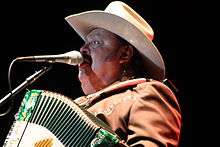Ramón Ayala
| Ramón Ayala | |
|---|---|
 Ayala in 2012 | |
| Background information | |
| Birth name | Ramón Covarrubias Garza |
| Born |
December 8, 1945 Monterrey, Nuevo León, Mexico |
| Genres | Norteño, Corrido, Conjunto, Tejano |
| Instruments | Accordion |
| Years active | 1963–present |
| Labels | Freddie Records[1] |
Ramón Covarrubias Garza (born December 8, 1945), known by his stage name Ramón Ayala, is a Mexican musician, composer and songwriter of Norteño and Conjunto music. Known as the "King of the Accordion," Ayala has recorded over 113 albums for which he has received four Grammy Awards. Additionally, Ayala has been featured in thirteen movies. A legend of norteño music, Ayala is one of the most recognized and best-selling artists of this genre of Mexican music, breaking many sales records along the way.
The Accordion
Ramon Ayala obtained his first accordion at the age of 5 years old. The accordion was a gift from his father, Ramon Covarruvias. In order to purchase the accordion his father sold a pig. Ramon Ayala had to frequently stick the buttons back on with chewing gum in order to play the accordion.The born skill of Ayala would pay off very soon, because after a short time the skill made him an expert with the accordion. Around 1958, the family decided to emigrate to a town located in the Mexican state of Tamaulipas, where Ramón worked as a laborer next to his brothers working in the cotton fields. On the weekends Ramon and his father would perform in the ¨cantinas¨ nearby.
Ramón, Cornelio, Los Relámpagos del Norte
In 1962, the destiny separates Ramón of his tula, while his progenitor undertakes a trip to McAllen Texas, he remains in Reynosa. It is there where he meets Cornelio Reyna, a singer with a very characteristic and guttural voice, who then alternated with a friend, Juan Peña acting in the cantina "El Cadillac," presenting himself as "Dueto Carta Blanca," Initially Ayala requested work as shoe polisher, but was soon allowed to demonstrate his abilities as chupatula, soon after Juan left Cornelio, leaving Ramón in his place, changing the name of the duet to "Los Relámpagos del Norte." Like Ayala, Cornelio Reyna had a modest way of life, he only had patched trousers and Ramón had two, and they shared their food under a tree, having a tomato crate as a table. The duo continued their wanderings, from bar to bar in search of work. However, Cornelio had already had the luck to record a disc next to Juan, for Falcón Records, but nothing had happened. On the basis of persistent work and effort, they managed to record a song that would gain them notoriety by 1963, "Ya No Llores," recorded by Bego Records, that would open the doors to success. The four years of stumbling had been left behind. This would be followed by "Comal y Metate," "Hay Ojitos," "Con La Tinta de mi Sangre," "Devolucion," and "Mi Tesoro." The young duo began to experience an overwhelming fame, initially locally and later nationally. One of the great merits of Cornelio and Ramón was to expand the musical taste for norteño music throughout the country, as authentic pioneers of the grupero movement in Mexico. However, 1971 was the year that marked the dissolution of the successful duet. Cornelio Reyna embarked on a solo career with relative success. Although many musical critics pointed to the event as the end of Ramón's career, since he only played the accordion, this was not the case.
Los Bravos Del Norte
A modest Monterrey businessman and visionary of the northern musical phenomenon who had once served as representative of Los Relámpagos del Norte decided to extend his support. Some time later, the band Los Bravos del Norte, which signed a contract with Marsol Records, an American phonographic label, would launch in the musical field, releasing their first recordings on a regular basis and with some success. At that time Antonio Sauceda joined Los Bravos del Norte. DLV catapults them again after finding success there. "Ni Por Mil Punados de Oro" would be the first. The harvest of successes takes place in a spaced but constant way. In 1974, Los Bravos del Norte received their first gold record for their sales index of the song "Chaparra de Mi Amor," this being also the year in which they debuted as vocalist of Los Bravos del Norte, singer Eliseo Robles. Their success continue until 1979. In 1986, they received another gold record and later a platinum record. In 1988, Eliseo Robles left Los Braves del Norte to start his own career. Juan Antonio Coronado would become the next vocalist of Los Bravos del Norte who, despite the comparisons managed to impose his style with Los Bravos del Norte recording hits like La Rama de Mesquite, Para Poder Llegar a Ti (for which he would receive another gold record), Tristes Recuerdos, Mi acordeón y Yo and many more. Súper Éxitos de Ramón Ayala includes: La Rama de Mesquite, Tragos Amargos, Buenos Días Señor Dios and Cumbia del Zoológico, among others. In 1992, Juan Antonio Coronado left Los Bravos del Norte. Mario Marichalar would join Los Bravos del Norte and would become the current vocalist.
References
Notes
- ↑ Barkley, Roy R. The handbook of Texas music. Texas State Historical Association. p. 261. ISBN 978-0-87611-193-2.
Bibliography
- Ragland, Cathy (2009). Música norteña: Mexican migrants creating a nation between nations. Temple UP. ISBN 978-1-59213-747-3.
- San Miguel, Guadalupe (2002). Tejano proud: Tex-Mex music in the twentieth century. Texas A&M UP. ISBN 978-1-58544-188-4.